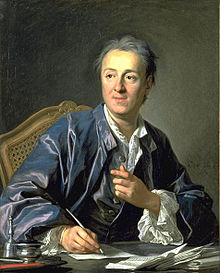- Jacques-André Naigeon
-
 A Portrait of a Young Artist by Jean-Honore Fragonard, presumed to be of Jacques-André Naigeon
A Portrait of a Young Artist by Jean-Honore Fragonard, presumed to be of Jacques-André Naigeon
Jacques-André Naigeon (July 15 1738, Paris - 28 February 1810, Paris) was a French artist, atheist philosopher, editor and man of letters best known for his contributions to the Encyclopédie and for reworking Baron d'Holbach's and Diderot's manuscripts.
Contents
Life and works
After trying his hand at painting and sculpture, Naigeon became a friend and associate of Denis Diderot, whom he helped to work on the Encyclopédie. He soon became involved with the Coterie Holbachique, a group of radical French Enlightenment thinkers centered around the Paris salon of Baron d'Holbach. Naigeon quickly adopted the Baron's atheist principles and collaborated with him on his works, overseeing their clandestine printing in Amsterdam and editing d'Holbach's Morale Universelle and his Essai sur les préjugés. Priding himself on a through knowledge of the classics, Naigeon would also edit a French translation of the works of Seneca begun by Nicolas La Grange, publishing it along with Diderot's Essai sur les régnes de Claude et de Néron (Paris, 1778). Other editorial work included the Essays of Montaigne, and a translation of Toland’s philosophical letters
 Naigeon is best-known for editing the works of the famous encyclopédiste Denis Diderot
Naigeon is best-known for editing the works of the famous encyclopédiste Denis Diderot
Naigeon became the editor, compiler, and commentator of Diderot's works after the latter made him his literary executor. He published an incomplete edition of Diderot's works in 1798 after writing Mémoires historiques et philosophiques sur la vie et les ouvrages de Diderot, an unfinished commentary on his life and works.
Naigeon's only original stand-alone work was Le militaire philosophe, ou Difficultés sur la religion, proposées au Pére Malebranche (London and Amsterdam, 1768) which was based on an earlier anonymous manuscript, and whose final chapter was written by d'Holbach. This work mostly repeated the atheist, anti-Christian, determinist materialist arguments found in the radical literature of the second half of the 18th century.
Naigeon continued his attacks on religion in his Dictionary of Ancient and Modern Philosophy in the Encyclopédie méthodique (1791–1794). In his address to the National Assembly in 1790 (Adresse à l'Assemblée nationale sur la liberté des opinions) he called for absolute freedom of the press, asking the Assembly to withhold the name of God and religion from their declaration of the rights of man.
Bibliography
Naigeon's works
- Les Chinois, a comedy written with Charles Simon Favart (1756)
- Le Militaire philosophe ou, Difficultés sur la religion proposées au R.P. Malebranche (London and Amsterdam, 1768) ;
- Éloge de La Fontaine (1775)
- Adresse à l'Assemblée nationale sur la liberté des opinions (1790)
- Dictionnaire de philosophie ancienne et moderne 3 vol. (1791-1794)
- Mémoire sur la vie et les œuvres de Diderot (1821)
Secondary literature
- Alan Charles Kors, "The Atheism of D'Holbach and Naigeon," Atheism from the Reformation to the Enlightenment (Oxford: Clarendon Press, 1992)
External links
- Le militaire philosophe - online text in French
Preceded by
Michel-Paul-Gui de ChabanonSeat 14 of the
Académie française
1803–1810Succeeded by
Népomucène LemercierBaron d'Holbach · Denis Diderot · Baron von Grimm · Jean-François Marmontel · Charles-Georges Le Roy · Guillaume Thomas François Raynal · Jean-François de Saint-Lambert · Jean-Baptiste-Antoine Suard · François-Jean de Chastellux · Augustin Roux · André Morellet · Jacques-André Naigeon
Figures in the Age of Enlightenment by country or region Notable figures America (English) America (Latin) England Edward Gibbon · Thomas Hobbes · Samuel Johnson · Edmund Burke (Irish born) · John Locke · Isaac Newton · Robert WalpoleFrance Germany Greece Hungary Italy Low Countries Poland-Lithuania Portugal Romanian States Russia Scandinavia Scotland Serbia Spain Ukraine Related topics Categories:- Members of the Académie française
- 1723 births
- 1810 deaths
- Writers from Paris
- Philosophes
- Materialists
- Determinists
- French encyclopedists
- Atheist philosophers
- Atheism activists
- French atheists
- French philosophers
- Enlightenment philosophers
- 18th-century philosophers
- 18th-century French writers
- French translators
Wikimedia Foundation. 2010.
